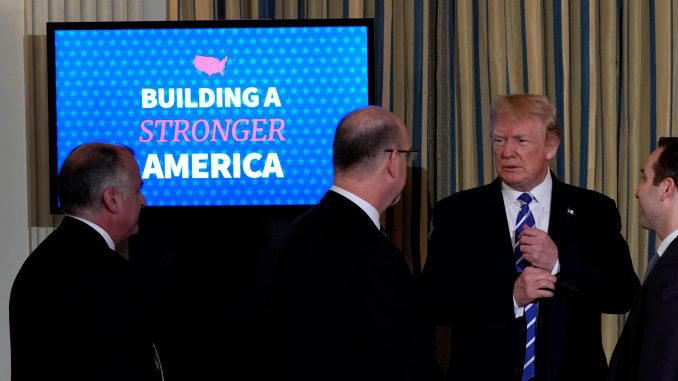
WASHINGTON, D.C. – President Donald Trump unveiled a long-awaited infrastructure plan on Monday that asks the U.S. Congress to authorize $200 billion over 10 years to stimulate $1.5 trillion in improvements paid for by states, localities and private investors. It would expand the use of tax-exempt private activity bonds (PABs), while lifting a cap on issuance of the debt.
The plan, which administration officials acknowledge faces a tough path ahead, would reshape how the federal government funds roads, bridges, highways and other infrastructure projects.
In remarks at the White House, Trump cited “the critical need to rebuild America’s crumbling infrastructure” and said his proposal would “spur the biggest and boldest infrastructure investment in American history.”
U.S. Transportation Secretary Elaine Chao told reporters that the government should lift hurdles to private sector infrastructure funding and encourage state and local participation. The federal government cannot do it alone, she said.
“Unfortunately, there’s not enough money to be able to pay for all the infrastructure needs of our country,” Chao said.
The plan does not offer nearly as much new federal funding as Democrats wanted nor does it directly address how the federal government will find the money it does call for. The administration called the proposal a starting point for negotiations.
The PABs provision is aimed at increasing the leveraging of federal funds to allow for more efficient infrastructure improvements, according to the president’s legislative outline for rebuilding infrastructure.
New uses for PABs would include construction of hydroelectric power generating facilities and environmental remediation for brownfield and superfund sites, as well as facilities for rural broadband, flood control, and storm water. The current use of PABs for airports, water ports, mass transit, water and sewer and surface transportation facilities would be expanded to allow more privately financed infrastructure projects to benefit from tax-exemption.
PABs would also no longer be subject to the alternative minimum tax in an effort to lower borrowing costs and increase their use, under Trump’s proposal. In addition, a federal population-based, per-state annual cap on the issuance of certain types of PABs would be lifted.
Tim Fisher, government affairs manager at the Council of Development Finance Agencies, said the proposal creates new PAB categories, while modifying others.
“It’ll take some time for us to evaluate the package as a whole, but I’m very pleased by the PAB improvements outlined in the proposal,” he said.
N.C. Department Transportation Secretary James Trogdon said that while it’s too early to comment on the specifics, the conversation is needed.
“We are encouraged that infrastructure funding is getting the public attention the proposal will bring in terms of the importance for additional transportation funding. We look forward to following the measure as it goes through the legislative process and to see the final details of the plan,” a statement from Trogdon’s office read.
The proposal would speed up the issuance of water permits and natural gas pipelines, saying environmental reviews for major projects should take no longer than 21 months – instead of years – and directs one federal agency rather than several different agencies to conduct the review.
“The problem the states have and local leaders have with funding the infrastructure is horrendous,” Trump said at the White House.
The interior secretary would have approval authority for natural gas pipelines that cross the country’s national parks, changing the requirement that Congress authorize such projects.
The proposal fits into the president’s broader plan to boost oil and gas development by slashing red tape, something that has cheered small-government advocates and industry but raised concerns among environmentalists and Democratic lawmakers.
“Trump’s plan is just another giveaway to corporations and wealthy developers at the expense of American workers, and it fails to address some of the most pressing infrastructure needs our country faces,” the Democratic National Committee said.
Trump is scheduled to visit the Orlando, Florida area on Friday to try to sell the plan to the public.



